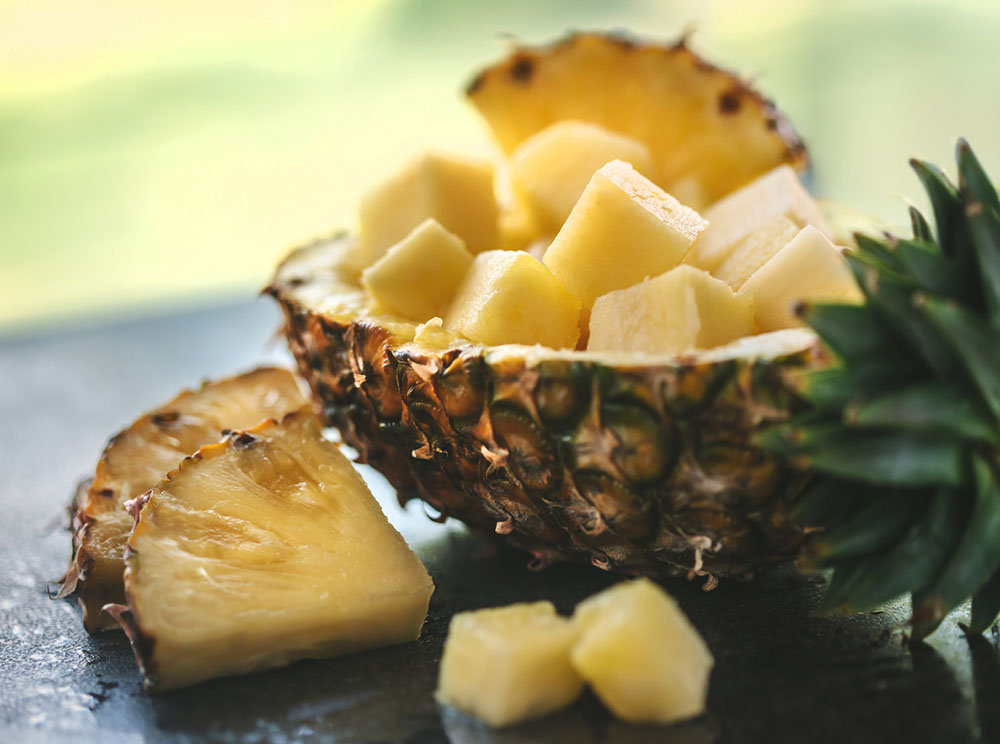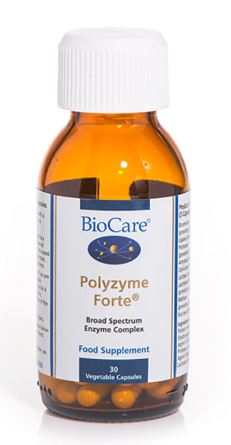This week in ‘Ask the nutritionist’, Nutritional Director Rick Hay reveals the natural ways we can combat symptoms of IBS and beat the Christmas bloat
Twas’ the month of Christmas bloat – mince pies, advent calendars, Prosecco, late nights – our tummies are dealing with a lot. For those of us susceptible to IBS symptoms, it can be an uncomfortable time of year.
Irritable Bowel Syndrome (IBS) can lead to recurrent abdominal pain, general feelings of stomach discomfort and changes in bowel habits. IBS symptoms can include, bloating, burping, feeling full, cramping and nausea – all things we don’t want to have to deal this Christmas.
But why should we deprive ourselves during this festive season? Turns out we might not have to say no to everything. Nutritional Director Rick Hay reveals a few natural ways that we can help alleviate our bloating and IBS issues when they strike.
IBS fix #1 Stock up on soothing herbs and teas
One of the easiest ways you can help alleviate bloating and IBS symptoms when they strike is by introducing soothing herbs and teas into your everyday diet. Antispasmodic herbs such as aloe vera, chamomile and peppermint are smooth muscle relaxants that will help to reduce cramping symptoms.
A 2013 study in the Journal of Research in Medical Sciences found that despite unfavorable symptoms of IBS, effective therapies are still lacking, however herbal agents can be used for symptom control.
The study saw 33 participants who suffered from IBS symptoms, drink 30ml aloe vera juice twice a day for eight weeks. In conclusion, aloe vera was shown to reduce abdominal pain and discomfort, as well as flatulence in IBS participants.
Aloe Vera, chamomile and peppermint are muscle relaxants that will help to reduce cramping
Hay advises having a herbal camomile tea before bed to help aid digestion and reduce symptoms of bloating overnight.
A 2015 study researching the impact of Chamomile extract on IBS symptoms also found that none of the currently available drugs are globally effective in treating all IBS symptoms.
However, the study saw 45 participants take 20 camomile drops daily for four weeks. Participants were asked to fill in an IBS-associated symptoms questionnaire to specify abdominal pain intensity, bloating, nausea, stool consistency and altered bowel habits.
Those taking the camomile found their IBS symptoms significantly reduced and claimed that that the improving effects of camomile on all IBS symptoms shows it may have a positive effect on the development of IBS as well.
Hay also recommends drinking soothing teas such as ginger and peppermint to again aid digestion and combat symptoms of IBS.
The NHS recommends peppermint oil as a non-prescription supplement than shown to be better at easing symptoms than prescribed muscle relaxants or fibre.
Additionally, taking turmeric as a supplement or adding it to food may also help with IBS symptoms. A 2013 review of research on turmeric published in the World Journal of Gastroenterology concluded that Turmeric is a ‘very promising new therapeutic option for the treatment of gastrointestinal diseases.’
IBS fix #2 Try a Low FODMAP diet
Food is a common trigger where digestive problems and IBS symptoms are concerned and restricting certain foods can dramatically improve these symptoms in some sensitive people or for those who suffer from IBS.
A diet low in fermentable carbs known as a ‘low FODMAP diet’ is clinically recommended for the management of Irritable Bowel Syndrome (IBS) or other types of bloating discomfort and there is a large body of scientific evidence showing it can really help.
The term FODMAP stands for ‘fermentable oligo-, di-, mono-saccharides and polyols’ which are scientific terms used to classify groups of carbohydrates that are known to trigger digestive symptoms like bloating, gas, stomach pain and other common symptoms found in IBS sufferers.
‘Food such as onions, lentils, rye, cabbage, broccoli, Brussels sprouts, beans and dried fruits are all high in FODMAPS and so are poorly absorbed by the gut. As a result they pass through and into the colon where they are fermented by bacteria.
‘This leads to excess gas being produced that casues cramping, bloating, wind and pain,’ explains Hay.
Unfortunatly, FODMAPS are found in a large number of everyday foods including oats and many fruit and vegetables including broccoli and cauliflower. That means the diet can be difficult to stick to, even if it means alleviating your symptoms.
Food such as onions, lentils, rye, cabbage, broccoli, Brussels sprouts, beans and dried fruits are all high in FODMAPS and so are poorly absorbed by the gut
A 2016 study published in the journal Gastroenterology and Hepatology, indicates that restriction of FODMAP foods is an effective dietary intervention for reducing IBS symptoms.
The randomized controlled trial found that a low FODMAP diet as well as taking probiotics had significantly improved IBS symptoms compared to those eating a normal diet.
‘Those who eat more high-FODMAP high foods have demonstrated prolonged hydrogen production in the intestine and colonic distension by fermentation,’ the authors said. ‘This has led to gas, bloating and stomach discomfort’.
So if you find yourself suffering from persistent bloating, a low FODMAP diet may help your symptoms improve.
You may also want to avoid inflammatory foods such dairy, gluten, spices, sugar, caffeine, alcohol and overly processed foods to see if your symptoms improve.
IBS fix #3 Get a grip on stress
You may be running at one hundred miles per hour, trying to fit everything in before Christmas arrives but Hay warns that you really shouldn’t over do it in any sense, from over-training to over-stressing because it’s bad news for your gut.
It turns out IBS could also be worsened by your mental health. In a 2014 review in the World Journal of Gastroenterology authors say, ‘More and more clinical and experimental evidence has showed that IBS is a combination of irritable bowel and irritable brain’.
Stress is considered a key cause of IBS symptoms, suggesting whatever is going on in your mind could be having a direct impact on your gut health.
IBS fix #4 Invest in a good probiotic
Probiotics are live bacteria and yeasts that are said to provide various health benefits. Often described as ‘good’ or ‘friendly’ bacteria, they’re usually found in yoghurts or taken as supplements.
Probiotics have been known to positively influence the balance of our microbiota (gut bacteria)
While probiotic yeasts and cultures occur naturally in fermented foods such as sauerkraut, kimchi (Korean pickles) and kefir (Eastern European cultured drink), they’re are also sold as supplements.
Probiotics have been known to positively influence the balance of our microbiota (gut bacteria). LAB 4 probiotics, as found in Biocare’s BioAcidophilus Forte, have been shown to reduce the severity and duration of abdominal pain and bloating, whilst improving the quality of life in those who suffer from IBS symptoms.
A clinical trial that looked into the efficacy of probiotics in alleviating the symptoms of IBS over an eight week intervention period, found that a significant improvement in symptoms as measured by the IBS Symptom Severity Score system used by doctors.
IBS fix #5 The importance of digestive enzymes
Digestive enzymes are substances produced by our bodies that help us digest and break down the foods we eat. Having all of our digestive enzymes working correctly is essential to healthy digestion and ensures the optimal absorption of nutrients from our food.
These enzymes help break down large macromolecules like proteins that are in the foods we eat into smaller molecules that our digestive system can then absorb.
As food travels through your digestive system, different enzymes break down specific food types. For example, lipase (produced by the gut) supports the conversion of fat into fatty acids and cholesterol, and amylase (also in the gut) is used in transforming carbohydrates into simple sugars.
If your body falters in producing any of these enzymes, the corresponding nutrients may not be absorbed as efficiently, which might impair digestion and lead to bloating and symptoms of IBS.
While our body creates digestive enzymes in its saliva, pancreas and gut (small intestine) they can also be found in certain foods and supplements which can help the process of digestion along.
Some fruits and vegetables are excellent natural sources of digestive enzymes including kiwi, papaya, pineapple, bananas, avocado, mangoes and pineapple.
Apple cider vinegar, sauerkraut, kimchi, miso, kefir, yoghurt and honey can help too as they’re also rich in digestive enzymes.
Sometimes it can be hard to keep up your good habits, meaning your digestive enzymes could be compromised. Supplementation with digestive enzymes may therefore give you an extra boost.
‘Taking digestive enzymes supports efficient digestion and helps the enzymes do their job,’ says Hay.
A 2018 study found that deficiency in digestive enzymes is believed to be one of the contributing factors for those who suffer from functional dyspepsia (a term used to describe a group of symptoms affecting the gastrointestinal tract, including stomach pain or discomfort, nausea, bloating and belching).
Other studies have suggested that supplementation with enzymes is beneficial for reducing symptoms of flatulence, bloating, belching and fullness.
In another study, researchers showed that enzymatic supplements reduced feelings of discomfort in healthy subjects after eating a high fat meal.
Hay recommends the supplement Polyzyme Forte from Biocare, a broad Spectrum Enzyme Complex which can reduce the severity and duration of abdominal pain and bloating.
If you often get bloated, try taking one with meals three times a day. Alternatively, if you only occasionally get bloated when you eat foods that don’t agree with you, take one before eating the problem foods.
More Healthista Content:
Christmas gift guide – 31 last minute healthy MUST HAVES
6 characteristics of highly sensitive people
5 bloating fixes you can do tonight
What is omega 3, 6 and 9 and which ones do you REALLY need?
Rick Hay is a nutritionist with a special interest in anti-ageing and many years clinical experience in nutrition, naturopathy and botanical medicine. He specializes in obesity treatment and weight management. He writes a regular Natural Health and Fitness Blog for Healthista. Find out more at rickhay.co.uk. Follow Rick on Twitter @rickhayuk

More from Ask the nutritionist:
The energy boosting supplement that could change the way you exercise
How to get healthy cholesterol levels
Which 2 essential nutrients does everyone need?
Like this article? Sign up to our newsletter to get more articles like this delivered straight to your inbox.


























































